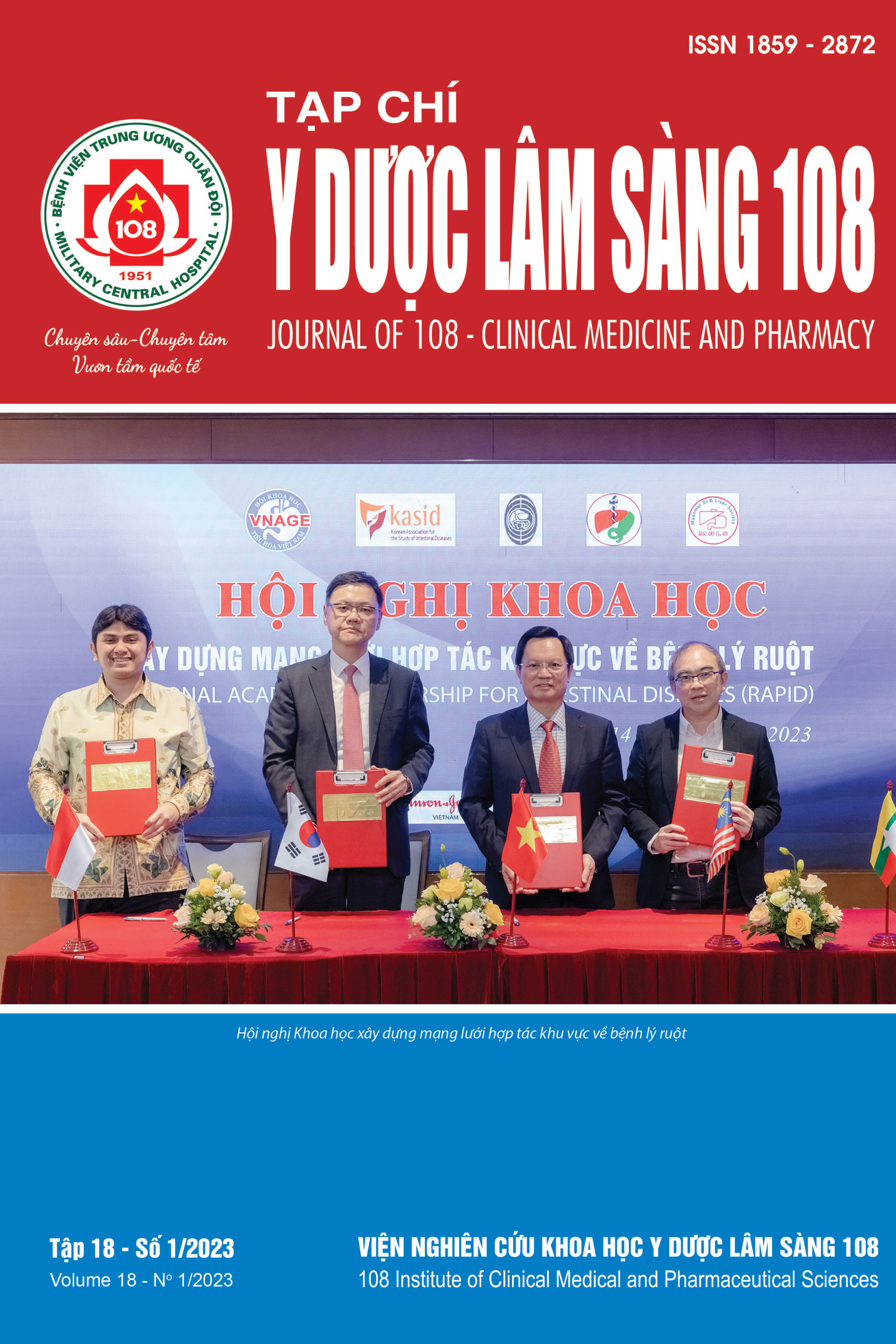Efficacy of autologous intrauterine infusion of platelet-rich plasma in recurrent implantation failure patients
Main Article Content
Keywords
Abstract
Objective: To evaluate pregnancy rates in patients with a history of two consecutive recurrent implantation failure (RIF) among patients who received autologous platelet-rich plasma (PRP) infusions before embryo transfer and those who did not. Subject and method: A retrospective cohort study of 414 RIF patients at the Fertility Center of Tam Anh General Hospital between 2020 and 2022. Result: There were no statistically significant differences between the groups for age, body mass index, infertility causes, previous cesarean delivery, or previous laparoscopic surgery for infertility (55 patients in the PRP group and 359 patients in the control group). Pregnancy rates in both groups were comparable (49.0% in the PRP group and 49.6% in the control group; p=0.97). Rates of biochemical pregnancy (7% vs. 7.8%, p=0.93), clinical pregnancy (42% vs. 41.8%, p=0.94), miscarriage (7% vs. 6.7%, p=0.85), ongoing pregnancy (35% vs. 35%, p=0.99), or embryo implantation (42% vs. 30%, p=0.21) did not differ significantly. However, the PRP group had a higher implantation rate (41.5% vs 30%, p=0.001) and a higher rate of ongoing pregnancy (34.1% vs 31.2%, p=0.79) among patients with a history of three or more consecutive failed embryo transfers. Conclusion: The pregnancy rate after embryo transfer did not differ significantly between the RIF patients with endometrial thickness higher than 9mm who underwent PRP infusion and the control group. Since the PRP group had a greater implantation rate than the control group, it should be considered in RIF patients with three or more consecutive failed embryo transfers.
Article Details
References
2. Shaulov T, Sierra S, Sylvestre C (2020) Recurrent implantation failure in IVF: A canadian fertility and andrology society clinical practice guideline. Reprod Biomed Online 41(5): 819-833.
3. Lin Y, Qi J, and Sun Y (2021) Platelet-rich plasma as a potential new strategy in the endometrium treatment in assisted reproductive technology. Front Endocrinol (Lausanne) 12: 1342.
4. Kelly MFB (2018) Platelet-rich plasma (PRP) - OrthoInfo - AAOS.
5. Zamaniyan M, Peyvandi S, Heidaryan Gorji H et al (2020) Effect of platelet-rich plasma on pregnancy outcomes in infertile women with recurrent implantation failure: A randomized controlled trial. https://doi.org/101080/0951359020201756247, 37(2): 141-145.
6. Tehraninejad ES, Kashani NG, Hosseini A et al (2021) Autologous platelet-rich plasma infusion does not improve pregnancy outcomes in frozen embryo transfer cycles in women with history of repeated implantation failure without thin endometrium. J Obstet Gynaecol Res 47(1): 147-151.
7. Xu Y, Hao C, Fang J et al (2022) Intrauterine perfusion of autologous platelet-rich plasma before frozen-thawed embryo transfer improves the clinical pregnancy rate of women with recurrent implantation failure. Front Med, 9.
8. Bakhsh AS, Maleki N, Sadeghi MR et al (2022) Effects of Autologous Platelet-Rich Plasma in women with repeated implantation failure undergoing assisted reproduction. JBRA Assist Reprod 26(1): 84.
9. Ershadi S, Noori N, Dashipoor A et al (2022) Evaluation of the effect of intrauterine injection of platelet-rich plasma on the pregnancy rate of patients with a history of implantation failure in the in vitro fertilization cycle. J Fam Med Prim Care 11(5): 2162.
10. Nazari L, Salehpour S, Hosseini S et al (2022) Effect of autologous platelet-rich plasma for treatment of recurrent pregnancy loss: A randomized controlled trial. Obstet Gynecol Sci 65(3): 266-272.
 ISSN: 1859 - 2872
ISSN: 1859 - 2872
